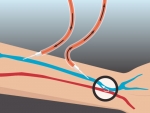Displaying items by tag: division of cardiovascular disease
CHAAMPS exists to develop, implement and evaluate interventions to improve African-American men’s health through research, outreach and training.
Tagged under
UAB Hospital houses a 21-bed cardiac care unit specializing in procedures such as heart transplants and cardiopulmonary rehabilitation.
Tagged under
Started in 1981, the Mr. and Ms. UAB Scholarship Competition is one of UAB’s longest-standing Homecoming traditions.
Tagged under
- national alumni society
- college of arts and sciences
- school of health professions
- school of engineering
- honors college
- collat school of business
- neuroscience
- department of biology
- department of english
- department of mechanical engineering
- division of cardiovascular disease
- school of medicine
- department of philosophy
- release
- department of biomedical engineering
Low dietary potassium leads to calcified arteries and aortic stiffness, while increased dietary potassium alleviates those undesirable effects in a mouse model, suggesting dietary potassium may protect against heart disease and death from heart disease in humans.
Tagged under
Care could improve for dialysis patients with development of bionanomatrix gel with $2 million grant
A UAB spinoff has received a stage two grant to test a potential solution for malfunctioning vascular access.
Tagged under
UAB Medicine has a long history of caring for patients with adult congenital heart disease, and the Alabama Adult Congenital Heart Program is the only one in Alabama and one of a handful in the country that provide continuing care for patients as they move into adulthood.
Tagged under
A program that supports historically disadvantaged health professionals chooses two researchers in the UAB Department of Medicine as finalists.
Tagged under
A fatty acid-derived bioactive molecule called lipoxin improved heart function after a heart attack, as the lipoxin prompted early activation of the resolving phase of the immune response.
Tagged under
UAB’s REGARDS study finds that disparities exist within men and older patients’ being prescribed stroke-preventing medication in the southeastern United States.
Tagged under
Anezi Uzendu, M.D., has touched the hearts of many patients and colleagues in his time at UAB; but now that reach is bigger than ever, after his own heart failed him.
Tagged under
Authors conclude that the relationship between the complexity of left main coronary artery disease and clinical outcomes varies over time and lay out approaches for individualized strategy of revascularization.
Tagged under
A UAB symposium on cardiovascular tissue engineering brought together some of the best in the business in this rapidly developing field of translational medicine.
Tagged under
Knowledge from this study and others may help physicians boost healing and prevent heart failure in patients after a heart attack.
The grant will initially fund two fellowship positions for postdoctoral fellows (basic or clinical) wishing to train in the area of heart failure research.
Tagged under
A heart attack can happen even if to those who are relatively young and fit, and genetics can play a role.
Tagged under
Diagnosing and treating women who might otherwise slide under the radar is the goal of UAB Medicine’s quickly growing Women’s Heart Health Clinic, which officially opened in 2017.
The findings suggest targeting specific T-cell subsets may be a therapeutic approach to prevent heart failure after a heart attack.
Tagged under
Some people inherit a condition that elevates their cholesterol to an excessive degree, and no amount of diet or exercise can bring the numbers down. UAB researchers are developing and testing a new peptide that may lead to better treatment options.



















